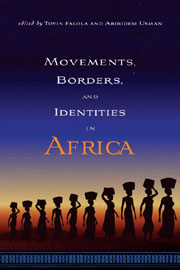Book contents
- Frontmatter
- contents
- Preface
- Introduction: Migrations in African History: An Introduction
- PART A State Formation and Migration Crossroads
- PART B Movements and Identities
- 6 Squatting and Settlement Making in Mamelodi, South Africa
- 7 “Scattering Time”: Anticolonial Resistance and Migration among the Jo-Ugenya of Kenya toward the End of the Nineteenth Century
- 8 Traders, Slaves, and Soldiers: The Hausa Diaspora in Ghana (Gold Coast and Asante) in the Nineteenth and Early Twentieth Centuries
- 9 Ethnic Identities and the Culture of Modernity in a Frontier Region: The Gokwe District of Northwestern Zimbabwe, 1963–79
- 10 Displacement, Migration, and the Curse of Borders in Francophone West Africa
- 11 Shifting Identities among Nigerian Yoruba in Dahomey and the Republic of Benin (1940s–2004)
- 12 Identity, “Foreign-ness,” and the Dilemma of Immigrants at the Coast of Kenya: Interrogating the Myth of “Black Arabs” among Kenyan Africans
- 13 Labor Market Constraints and Competition in Colonial Africa: Migrant Workers, Population, and Agricultural Production in Upper Volta, 1920–32
- List of Contributors
- Index
10 - Displacement, Migration, and the Curse of Borders in Francophone West Africa
from PART B - Movements and Identities
Published online by Cambridge University Press: 12 September 2012
- Frontmatter
- contents
- Preface
- Introduction: Migrations in African History: An Introduction
- PART A State Formation and Migration Crossroads
- PART B Movements and Identities
- 6 Squatting and Settlement Making in Mamelodi, South Africa
- 7 “Scattering Time”: Anticolonial Resistance and Migration among the Jo-Ugenya of Kenya toward the End of the Nineteenth Century
- 8 Traders, Slaves, and Soldiers: The Hausa Diaspora in Ghana (Gold Coast and Asante) in the Nineteenth and Early Twentieth Centuries
- 9 Ethnic Identities and the Culture of Modernity in a Frontier Region: The Gokwe District of Northwestern Zimbabwe, 1963–79
- 10 Displacement, Migration, and the Curse of Borders in Francophone West Africa
- 11 Shifting Identities among Nigerian Yoruba in Dahomey and the Republic of Benin (1940s–2004)
- 12 Identity, “Foreign-ness,” and the Dilemma of Immigrants at the Coast of Kenya: Interrogating the Myth of “Black Arabs” among Kenyan Africans
- 13 Labor Market Constraints and Competition in Colonial Africa: Migrant Workers, Population, and Agricultural Production in Upper Volta, 1920–32
- List of Contributors
- Index
Summary
The issues of displacement, migration, and borders in Francophone West Africa will be addressed here by studying The Suns of Independence, the famous novel by Ahmadou Kourouma, from the Ivory Coast, first published in 1968. I will focus almost exclusively on the main character, Fama, a proud and “crazy Malinke,” as people around him perceive him. The issues of displacement, migration, and borders, brought about by colonialism and the first years of independence, are still pertinent today. Borders are part of all kinds of “curses brought by the suns of Independence” (35) and “invented by the devil” (91), long with colonization and district commissioners. Colonialism and the first years of independence have brought along with them a series of evils for African rural society, including the movement and displacement of populations. Fama, our Malinke, sees colonialism and independence as the same thing: independence has brought him only one thing, ruin, or worse, the “national identity card and the party membership card” (14). The politics of independence have made matters even worse. Borders were reshuffled and consolidated, according to the new ideology of nationstatehood, by African leaders. Whole segments of populations, such as the Malinke, were deprived of all political and economic power by the forces of independence. These populations fell back on a life of degradation, humiliation, and sterility, three words that the novel constantly hammers home. For example, the character Fama Doumbouya, the last legitimate descendant of the prince of Horodugu, is reduced almost to begging to survive, his cultural, political, and personal situation turned upside down, first by colonialism and then by independence.
- Type
- Chapter
- Information
- Movements, Borders, and Identities in Africa , pp. 226 - 237Publisher: Boydell & BrewerPrint publication year: 2009



